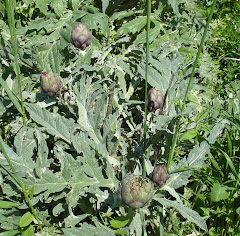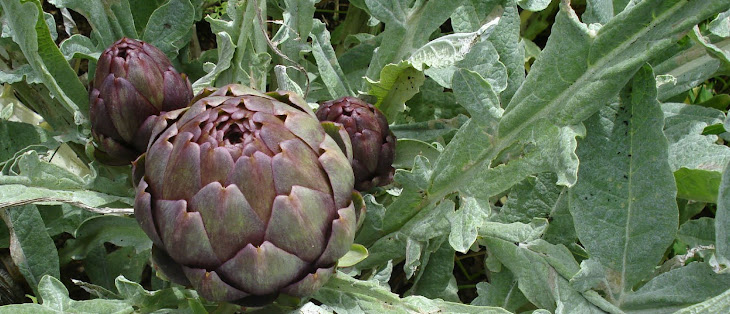There seem to be so many problems with the food that we eat in western Europe that it's difficult to know where to start with campaigning for change. But I think the keys to good sustainable food lie in words like 'local' and 'community'. The opposite, in other words, of industrialised agriculture, mass distribution and supermarkets. Whenever I go to a supermarket these days - and yes, I do go to supermarkets ... less and less, but we do buy stationery, toiletries and coffee from them - I find their products less and less tempting. I believe that buying our food in local shops and markets is best for the planet, but I also know it is best for us, for taste, quality and value.
We're lucky in Gabian, with our local shop where Mme Clapier sells a wonderful selection of food, Wednesday market, Thursday and Saturday shellfish vans, and Friday butcher's van we can buy all the excellent locally produced food we need within a few metres of our house, and usually we chat with friends while we buy as the market is a meeting place for the village.
 |  |
 | It was cold this morning when Lo Jardinièr went out so the market wasn't busy, but the usual stalls were there: clothes, fish, vegetables and charcuterie. |
Not everyone can reach a market like this so easily, and I was interested to see an article in today's Guardian online about food co-ops in Wales and England. Local people in London, Manchester, Lewes, Bristol and the Rhondda, among other places, are getting together to form non-profit-making food buying and distribution organisations. This seems to me to be the future for good food in Britain and in other countries too. These people are refusing to pay the artificially high prices which supermarkets charge for organic, free-range food and are buying directly from local producers, saving themselves money rather than adding to the profits of the big supermarkets, eating better food and avoiding the huge carbon footprint of large-scale food transportation.
In Wales, the Welsh Assembly is supporting an initiative to set up food co-ops, with the result that 180 have been launched, involving 60,000 families. As the organiser, Dan Dempsey says, "Supermarkets don't have to dominate."
Click on the link above to read the article, but here are some examples:
Trealaw Food Co-op, south Wales has 200 members and its volunteers have recently won a Social Enterprise Volunteer of the year award. The members say they can buy for £3 the amount of food which would cost them £7 in a supermarket and, as a bonus, they make friends with each other so that the co-op enhances community feeling and mutual support.
Food for All, Hartcliffe, Bristol also has 200 members who support a shop which is open 5 days a week selling organic fruit and vegetables from a local community garden and meat and cheese from a nearby Somerset farm shop. Their website says that they "believe in stocking food from local suppliers. We want to support local businesses. We also want to cut down on harm to the environment through 'food miles'. We believe that local food is more likely to be fresh and healthy." I agree!
I think it is very exciting that people in communities like these are taking food supply into their own hands, supporting each other and their local producers, in a tradition which goes back to the mid-nineteenth century. I'll carry on buying food at Gabian market and in local shops, but if I were still living in Wales I'd want to be involved in one of these co-operatives!








No comments:
Post a Comment